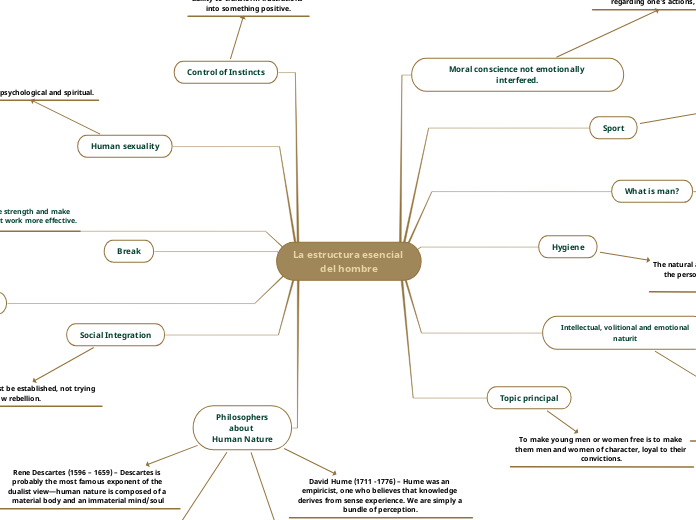La estructura esencial
del hombre
Moral conscience not emotionally interfered.
Irresponsibility, such as hypersensitivity regarding one's actions, must be avoided.
Sport
it constitutes a very effective means to derive energies that could lead badly
What is man?
Man is a composite of
two elements: body and
spirit.
It is what distinguishes
him from the
animal.
Hygiene
The natural and habitual correspondence between the person’s external appearance and their internal situation.
Intellectual, volitional and emotional
naturit
Will allow the adolescent to conclude the achievement of human fulfillment.
The undistorted reception of reality, the ability to assess it critically and the creative spirit.
Topic principal
To make young men or women free is to make them men and women of character, loyal to their convictions.
Control of Instincts
Has the
ability to transform frustrations
into something positive.
Human sexuality
it expands to the psychological and spiritual.
To restore strength and make
subsequent work more effective.
Break
Fun
Useful to the body and the spiritt:
rest and reinforcement
Social Integration
Respect and trust must be established, not trying to show rebellion.
Philosophers
about
Human Nature
Rene Descartes (1596 – 1659) – Descartes is probably the most famous exponent of the dualist view—human nature is composed of a material body and an immaterial mind/soul
David Hume (1711 -1776) – Hume was an empiricist, one who believes that knowledge derives from sense experience. We are simply a bundle of perception.
Jean Jacques Rousseau (1712 – 1778) – Rousseau is
famous for his belief in the goodness of humans before the corrupting influence of civilization [the so-called “noble savage.”]
Thomas Hobbes (1588-1659) – Hobbes was a materialist [one who believes only matter exists] who rejected dualism [the idea that both matter and mind/soul exist.] He argued that the idea of an immaterial soul made no sense, espousing instead a materialistic explanation for all states of body and brain—human nature is exclusively materialistic.
